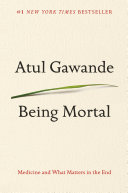
Being Mortal
Medicine and What Matters in the End
- In contemporary societies, by contrast, old age and infirmity have gone from being a shared, multigenerational responsibility to a more or less private state -- something experienced largely alone or with the aid of doctors and institutions
- At one time, we might have turned to an old-timer to explain the world. Now we consult Google, and if we have any trouble with the computer we ask a teenager
- But the dismal finances of geriatrics are only a symptom of a deeper reality: people have not insisted on a change in priorities. We all like new medical gizmos and demand that policy makes ensure they are paid for. We want doctors who promise to fix things. But geriatricians? Who clamors for geriatricians? What geriatricians do -- bolster our resilience in old age, our capacity to weather what comes -- is both difficult and unappealingly limited
- Creating geriatric specialists takes time, and we already have far too few. In a year, fewer than three hundred doctors will complete geriatrics training in the United States, not nearly enough to replace the geriatricians going into retirement, let alone meet the needs of the next decade.
- Prosperity has enabled even the poor to expect nursing homes with square meals, professional health services, physical therapy, and bingo. They've eased debility and old age for millions and made proper care and safety a norm to an extent that the inmates of poorhouses could not imagine. Yet still, most consider modern old age homes frightening, desolate, even odious places to spend the last phase of one's life.
- That was the beginning of the modern nursing home. They were never created to help people facing dependency in old age. They were created to clear out hospital beds -- which is why they were called 'nursing' homes
- The sociologist Erving Goffman noted the likeness between prisons and nursing homes half a century ago in his book "Asylums." They were, along with military training camps, orphanages, and mental hospitals, "total institutions" -- places largely cut off from wider society.
- With 'assisted living,' as Wilson's concept became known, the goal was that no one ever had to feel institutionalized.
- When horizons are measured in decades, which might as well be infinity to human beings, you most desire all that stuff at the top of Maslow's pyramid -- achievement, creativity, and other attributes of 'self-actualization.' But as your horizons contract -- when you see the future ahead of you as finite and uncertain -- your focus shifts to the here and now, to everyday pleasures and the people closest to you.
- A survey of fifteen hundred assisting living facilities published in 2003 found that only 11 percent offered both privacy and sufficient services to allow frail people to remain in residence. The idea of assisted living as an alternative to nursing homes had all but died.
- As people become aware of the finitude of their life, they do not ask for much. They do not seek more riches. They do not seek more power. They ask only to be permitted, insofar as possible, to keep shaping the story of their life in the world -- to make choices and sustain connections to others according to their own priorities.
- Hospice has tried to offer a new ideal for how we die. Although not everyone has embraced its rituals, those who have are helping to negotiate an ars moriendi for our age
- When there is no way of knowing exactly how long our skeins will run -- and when we imagine ourselves to have much more time than we do -- our every impulse is to fight, to die with chemo in our veins or a tube in our throats or fresh sutures in our flesh. The fact that we may be shortening or worsening the time we have left hardly seems to register.
- In other words, people who had substantive discussions with their doctor about their end-of-life preferences were far more likely to die at peace and in control of their situation and to spare their family anguish.
- The less seems almost Zen: you live longer only when you stop trying to live longer.
- She was starting to grasp that this is what the closing phase of a modern life often looks like -- a mountain series of crises from which medicine can offer only brief and temporary rescue. She was experiencing what I have come to think of as the ODTAA syndrome: the syndrome of One Damn Thing After Another.
- In the end, people don't view their life as merely the average of all of its moments -- which, after all, is mostly nothing much plus some sleep. For human beings, life is meaningful because it is a story. A story has a sense of a whole, and its arc is determined by the significant moments, the ones where something happens. Measurements of people's minute-by-minute levels of pleasure and pain miss this fundamental aspect of human existence.
- Our ultimate goal, after all, is not a good death but a good life to the very end.
- Endings matter, not just for the person but, perhaps even more, for the ones left behind.
- Whenever serious sickness or injury strikes and your body or mind breaks down, the vital questions are the same. What is your understanding of the situation and its potential outcomes? What are your fears and what are your hopes? What are the trade-offs you are willing to make and not willing to make? And what is the course of action that best serves this understanding?